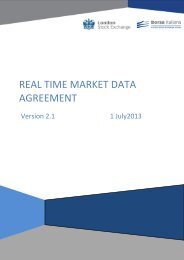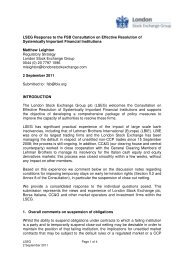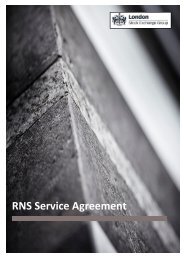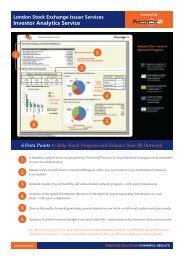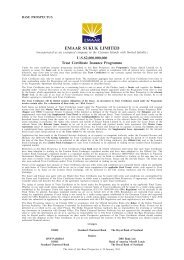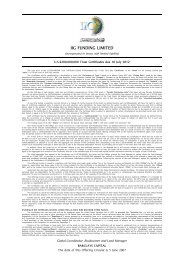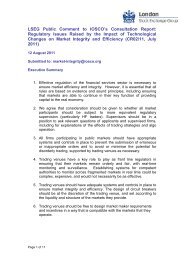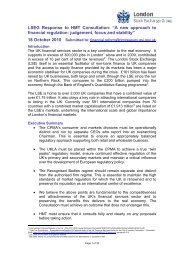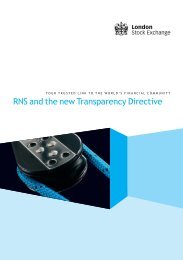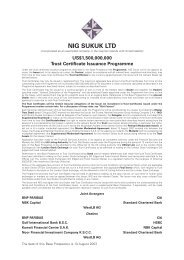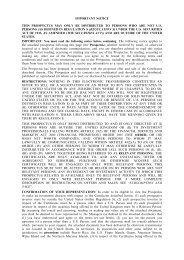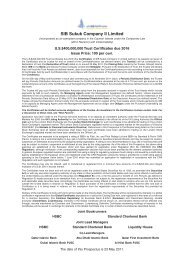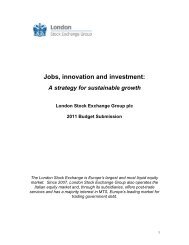Tabreed 06 Prospectus - London Stock Exchange
Tabreed 06 Prospectus - London Stock Exchange
Tabreed 06 Prospectus - London Stock Exchange
Create successful ePaper yourself
Turn your PDF publications into a flip-book with our unique Google optimized e-Paper software.
* Fawaz Elhindi, Marketing Manager – Abu Dhabi & Al Ain, has a BSc in Mechanical Engineering<br />
from the University of Louisiana, USA. He has over 20 years’ experience in sales and marketing<br />
working for leading multinationals in the Middle East. He is a member of the American Society<br />
of Mechanical Engineers.<br />
* Issa Cattan, IT Manager, has a BSc in Economic and Computer Science from Yarmouk<br />
University, Jordan. He has extensive experience with computers and has held managerial<br />
positions in leading computer system companies.<br />
There are no potential conflicts of interest between the duties to <strong>Tabreed</strong> of the persons listed above<br />
and their private interests or other duties.<br />
Employees<br />
<strong>Tabreed</strong> had 274 employees as at 31 December 2005, including all its subsidiaries, none of whom are<br />
members of any trade union in any jurisdiction in which <strong>Tabreed</strong> does business.<br />
In addition to operations in Bahrain, Bahraini nationals are entitled to join labour unions although<br />
<strong>Tabreed</strong> does not currently anticipate its employees joining any labour union.<br />
Employees who are citizens of the UAE or Bahrain are covered by a federal pension plan. The UAE<br />
employees and the Company contribute on a monthly basis. In Bahrain, only the Company<br />
contributes to the plan (the name of the institution is GOSI – General Organization for Social<br />
Insurance). Expatriate employees accrue end of service benefits defined by the Company’s Policies and<br />
Procedures, employee contracts and Federal Law. End of service liabilities are accounted for.<br />
Risk Management<br />
Competitive Environment<br />
<strong>Tabreed</strong> and its district cooling subsidiaries and associates are the leading commercial district cooling<br />
companies in the UAE and the Gulf region.<br />
A recent development is the creation of captive central cooling for most of the major Dubai based<br />
real estate projects. Two joint venture companies have been formed to develop the district cooling for<br />
these projects:<br />
* Empower: a joint venture between DEWA and TECOM, for the Dubai Holdings<br />
developments; and<br />
* Palm District Cooling: a joint venture between the Nakheel Group and Al Ghurair Group, for<br />
the Nakheel Group developments.<br />
Whilst primarily serving a captive market, these companies have attempted to bid for non-captive<br />
contracts as well. To date, <strong>Tabreed</strong> has not lost any contract that was awarded on a competitive<br />
basis to these companies.<br />
Emaar’s initial properties did not previously use district cooling, but the company launched a district<br />
cooling subsidiary in 2004 that could potentially serve Emaar’s new developments in the future.<br />
<strong>Tabreed</strong>’s management is aware of the competition, but takes comfort from the fact that the<br />
Company’s medium term growth is protected by signed customer contracts. For growth beyond that,<br />
management expects a substantial portion to come from clearly established further build-out potential<br />
on the signed contracts. Thus, management believes that the next five years’ growth in assets (and<br />
hence the revenues out of those assets for the following 20 years) is not vulnerable to competitive<br />
pressures. More importantly, competition will not adversely affect cash flows under the existing<br />
contracts, and probably wouldn’t affect the (highly profitable) build out of those plants.<br />
Management believes that the main barrier to entry into the district cooling market is the substantial<br />
initial capital and long term financing requirements for development of district cooling projects which<br />
may prove an obstacle to its competitors. But, even so, management considers the market sufficiently<br />
large to accommodate multiple players.<br />
The Company follows an established procedure and tracks the progress through a Scheme Initiation<br />
form. The form is initiated by marketing and if approved by the CEO results in a development<br />
business unit being created with a budget. The form then is processed through the engineering,<br />
projects, operation & maintenance and the finance departments. During this time, approximately six<br />
months, negotiations with the customer are ongoing. If we are successful and a contract is signed and<br />
all the department sign offs have been obtained, the development business unit is converted into a<br />
project business unit with the appropriate capital budget and implementation begins.<br />
64



